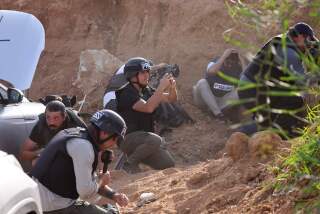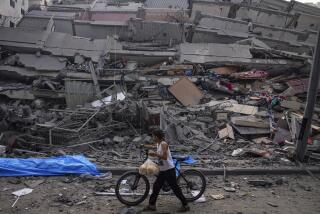To Get the Story, You Have to Get to the Story
- Share via
AMARAH, Iraq — With Iraqis poised to elect a new government -- at a time when it is particularly compelling for the world to hear their thoughts -- most Western journalists are forced to operate on a short leash, unable to casually approach many Iraqis or leave Baghdad without the help of the U.S. military.
A year ago, reporters generally were able to interview Iraqis on the capital’s streets and travel across the nation. Now, because of the deteriorating security situation, they can hardly go out in Baghdad, much less the rest of the country.
In Baghdad, they make appointments, traveling swiftly to and from their interviews with barely a moment to take in the mood of the street. Some journalists now live exclusively in the heavily fortified Green Zone, cut off from most of the country.
Traveling by road outside the capital has become unsafe since abductions became commonplace during the summer; an Italian and two French journalists were among those taken hostage. And most Western reporters have determined that their only option is to turn to the U.S. and British embassies for transportation help.
The embassies, with the power to commandeer military helicopters, armed with gunners and personal security details, allow journalists to leapfrog the ring of danger around Baghdad and visit the rest of the country.
After being airlifted in, some reporters are able to go out on their own in relatively safe areas such as Kurdistan and parts of southern Iraq. Others stay for long periods with the military. (Journalists also routinely use Iraqi interpreters and correspondents to report on places unsafe for Westerners.)
But in most cases, reporters seeking to do their jobs must rely on the embassies, especially for one- and two-day trips focused on the Jan. 30 election.
But with the mobility come some hindrances. Western government officials exert control over the journalists’ itineraries, set up interviews, and decide who and what will be seen. The arrangements can make the trips efficient but preclude the type of free-ranging reporting that journalists usually do on their own.
Still, most journalists think this is better than not getting out at all. Yet even under these conditions, there is no guarantee there will be a story, as reporters learned Saturday on a British Embassy-organized trip to Amarah, a turbulent town in southern Iraq.
The trip was meant to show firsthand the election campaigns of various slates and to allow reporters to gauge voters’ attitudes in this predominantly Shiite Muslim southern province, whose people view themselves as fiercely independent of Baghdad and of the British troops stationed in their midst.
The trip was also touted as a rare chance for reporters to visit the indigenous Marsh Arab population, one of the groups most persecuted by former Iraqi President Saddam Hussein.
The departure time for Maysan, the province of which Amarah is the capital, was set for 7:25 a.m. The journey on a U.S. Black Hawk helicopter would be about 90 minutes.
The day dawned gray and chill, a thin mist turning Baghdad’s usually dry air damp. Some of the reporters gathered at the Green Zone checkpoint staffed by Nepalese Gurkhas shivered.
A dozen reporters were scheduled to go, but as is often the case, several were no shows.
One had been trapped in a checkpoint line, waiting to have his equipment scanned by U.S. soldiers before he could enter the Green Zone. There are no express lines for reporters, and when trying to enter the heavily fortified area, they stand in the same queues as Iraqis, whom the soldiers search meticulously.
A second had thought that the meeting time was 8 a.m. rather than 7. That reporter had misheard the British Embassy public affairs officer -- the telephone lines are so poor.
Those on hand waited eagerly for the choppers as the mist turned to rain and the wind whipped the palm trees that edge the field.
Eight o’clock, the designated liftoff time, came and went with no sign of the helicopters. They had mechanical problems, we learned, and were still in Balad, a military base about 45 miles northeast of Baghdad. They would arrive at 9 a.m., we were told.
British public affairs officer Victoria Whitfield frantically tried to reach officials in Amarah on her cellphone to let them know we would be late. She also tried to reach dispatchers to seek alternative choppers.
Worried by the delay, and determined to make the trip work, she explained that we would be briefed by a military officer who best knew the election picture on the ground. The reporters, she said, would then split into two groups, one interviewing political candidates and the other visiting a village of Marsh Arabs.
It wasn’t until close to 10:15 a.m. that we finally heard the whir of the propellers.
We ran across the wet tarmac, the wind and the weight of our flak jackets slowing us to a lumbering jog. As the helicopters lifted off, rivulets of rainwater skittered along the loose door frames, soaking those seated nearest.
On the way to Amarah, we stopped to refuel in a wind-swept airfield where the rush of the propellers sent swelling puddles coursing across the tarmac.
In Amarah, it was raining in earnest and those who had not been dampened in the helicopter were now as soaked as those who had been. Some reporters’ teeth were chattering uncontrollably; few could grasp a pen in their numb fingers, let alone write. An Iraqi journalist struggled to get a green plastic garbage bag wrapped around his camera as the wind whipped it away from him.
As we stood in the rain, the bad news came quickly: The local British Embassy officials had canceled the event. Because we were so late, the candidates had gone home.
Moreover, the British military officer who worked most closely with local election officials was in town and could not brief us. And, we learned, the marsh trip had been called off too.
Several reporters pleaded with an officer for some kind of briefing or ride into town to look at election banners and interview local police.
The British troops, all from the 1st Battalion Welsh Guards, usually based near Cardiff, Wales, were unfazed. The window had closed for the election event, they said. They could not brief reporters and they did not have the security forces to take us into town.
The most they could offer us was that most British of comforts: a cup of tea.
A little later, perhaps taking pity on the bedraggled group, they threw in an English lunch: bangers and onions, two kinds of potatoes, green peas and gravy. And more tea.
Because of the rain and security concerns, we had to be back on the bone-chilling choppers no later than 2:30 p.m., barely two hours after our arrival. Almost at the last minute, Whitfield prevailed on senior military officials to at least give a quick briefing.
The commanding officer, Lt. Col. Ben Bathurst, ran over the main features of Amarah, occasionally deferring to his Iraqi interpreter on political questions.
Among the main points: Despite rebel Shiite cleric Muqtada Sadr’s strength in the province, his loyalists were not blocking the election; and Iraqi police were fully prepared to patrol and monitor the polling places but British troops would be at police stations, moments away if needed.
In addition, he said, car bombs were viewed as the biggest threat on election day and to counteract them most people would have to walk to polling places. It could take several days for the voting to be completed, he said, because of likely delays caused by the travel limitations, the sheer number of people expected to participate and their unfamiliarity with the process. Bathhurst did not yet know whether the national election commission would allow such an extension.
It was a briefing that we could have gotten only by going to Amarah, but hardly enough for a story.
Shivering, wet and with little in our notebooks, we flew back to Baghdad. After landing we talked about what we would file from our 10-hour day.
The consensus: Not much.
More to Read
Sign up for Essential California
The most important California stories and recommendations in your inbox every morning.
You may occasionally receive promotional content from the Los Angeles Times.













